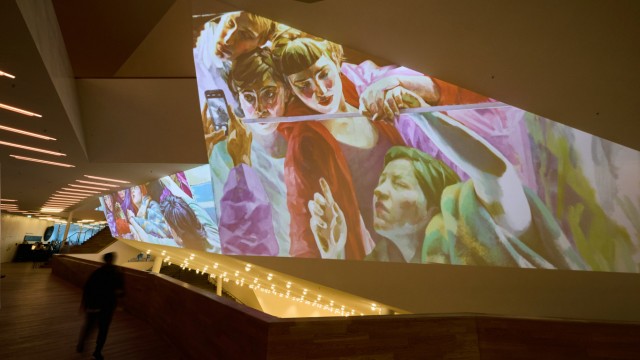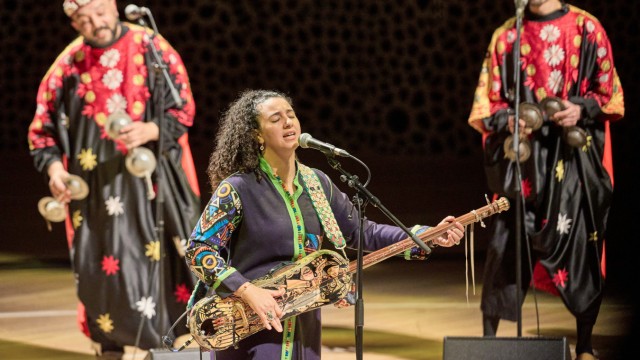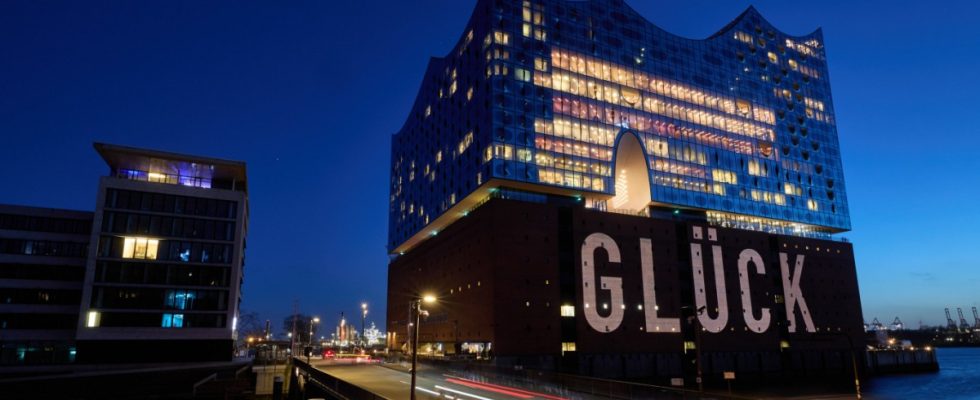Florian Boesch didn’t get particularly far with his winter trip. The singer was stopped after the second verse. Because Peter Sloterdijk had a question. How does the hiker in Schubert’s famous song cycle actually know where a path is since there is fresh snow everywhere? He then preferred to answer this rhetorical question himself, or rather: not. Actually, the joke was just the reason Sloterdijk was looking for to quickly deviate from the winter journey.
In the Recital Hall of the Hamburg Elbphilharmonie, where André Heller’s nine-day festival ” Reflexionor” opened on Saturday, the philosopher preferred to set up a lot of signposts into cultural history in order to leave the path of his original question: who Schubert’s Wanderer actually was and what he was He had asked Boesch without waiting for an answer that he had experienced something so traumatic in the house in which he moved in and moved out again that he fled into the cold at night and under the moon.
A critical look at the human inability to “be and let be”
It was more of an entertaining way of getting lost in high-cultural snippets of anecdotes and funny formulations that Sloterdijk offered in an hour and a half seminar on Schubert’s “Winterreise”. The joke in this educated middle class event often drew its resonance from the fact that the television philosopher mocked the lack of culture of our time. For example, the French only know their poet Alphonse de Lamartine because a line from his mourning poem “L’isolement” stands as a motto in every French cemetery today: “A single person is missing, and the whole world is empty.” Or that humanity’s odyssey should actually be told along the lines of the pedestrian transformation from pilgrim to hiker to tourist and refugee, although Sloterdijk sees humanity as having now reached the point where legs have become quite superfluous. “Short stubs are enough,” he says, given the lack of movement in our unromantic screen age.
André Heller is on stage in the Great Hall of the Elbphilharmonie during his Reflexionr Festival.
(Photo: Georg Wendt/dpa)
André Heller was allowed to curate the diverse program in his honor and gave him a motto that comes from Karl Valentin: “The stranger is only a stranger in a stranger.” In a sketch, the Munich satirist once explained the meaning of the term as follows: “The Hofbräuhaus, for example, is no stranger to most Munich residents – but most museums are strangers to them.” Peter Sloterdijk is no stranger to this strangeness with the stranger, although he is probably more at war with the Hofbräuhaus and its culture, because his message is the preservation of the cultural sublime, where there is no way around the museum.

The projection “Strangers in a stereotypical world, Exiles 2” by the artist Xenia Hausner is projected onto the ceiling in the foyer of the Elbphilharmonie as part of the Reflexionor Festival by the multimedia artist André Heller.
(Photo: Georg Wendt/dpa)
His professorial hike through the snowy landscape of Schubert’s sadness with the text by Wilhelm Müller was nevertheless neither analysis nor contemplation, but a race for shortcuts. It was only a stone’s throw from Thomas Mann’s statement about music as a “demonic realm” to Goethe’s condemnation of Caspar David Friedrich’s romantic icon “Abbey in the Oak Forest”. The lecture turned to Nietzsche from Emil Cioran’s paradoxical sentiments about the misfortune of being born. Next in the humorous scavenger hunt came Heidegger, Heine and Beckett’s famous sentence about people: “They give birth astride the grave.”
And when one of the best experts and interpreters of romantic song culture, Florian Boesch, was allowed to make an explanatory remark, for example that the moon used to be the only point where separated lovers could unite their gaze at night, Sloterdijk summed up the objection pointedly together: The moon of romanticism is “the lyrical anticipation of satellite radio”. The audience laughed, as did André Heller, who later even had to tell a funny anecdote himself when the action moved to the Great Hall of the Elbphilharmonie.
Otherwise, with lots of world music and a light display by Heller on the outside of the Elbphilharmonie, the festival follows the stated intention of “bringing people together who may have previously been strangers to each other.” That’s why the really big show was a “Sufi Night”. But because Hind Ennaira and the ensemble Black Koyo, who were supposed to start the evening, simply didn’t show up on German punctuality, the multi-talented Heller also tried to fill the break. Recently in Vienna, a taxi driver greeted him with “Hello, Mr. Hundertwasser,” only to add, after a few minutes of thought, that he was now embarrassed because his guest was dead.
Heller is trying to create a good mood at his festival on the explosive topic of strangers and enmities. In a time when the only thing that seems to matter is whether one stands for or against the conflicting parties of the present, it is a conciliatory invitation to attend a musical service in honor of Allah. The Moroccan gimbri player – that’s the name of the lute of North African folk music – Hind Ennaira played the instrument like a slap bass and was surrounded by young men with castanets who, led by a woman, celebrated their Gnawa music like a liberation party, including Moroccan breakdancing -Moves.

Hind Ennaira, Gnawa musician and Gimbri player.
(Photo: Georg Wendt/dpa)
The Pakistani Qawwali, which Nusrat Fateh Ali Khan, who died in 1997, developed, among other things, through his collaboration with Peter Gabriel and Massive attack also made him famous in the West. Fareed Ayaz, Abu Muhammad Qawwal and their musical brotherhood celebrated this strongly rhythmic call-and-response music, which is played while sitting with harmonium and percussion, as a furious sermon of short melodies, during which they met the over 2000 visitors in the hall several times to sing praises to Allah in many voices. Probably without them noticing.
This is how the seducer André Heller plays with the audience. But he pays attention to balance. As the festival format continues, which in previous years has already been dedicated to the composer John Zorn, the guitarist Bill Frisell and the singer Angélique Kidjo, Heller will also show a “kaleidoscope of Jewish singing traditions” with the Brooklyn Cantors, the Voices of Yemen and the Piyut Ensemble as well as concerts with music of African roots, including Angélique Kidjo and the Soweto Gospel Choir. This means that all Abrahamic religions will be united with musical prayers.
Finally, the film series “André Heller’s Human Children” accompanies the reflected friendship with the stranger. The program, which also interviews Andrea Breth, Christoph Ransmayr and Sophie Freud, started with the soprano Jessye Norman, who died in 2019. Filmed in 2005 in Yves Saint Laurent’s paradise garden Majorelle and the Ksar Char-Bagh palace in Marrakech, in which Norman looks like a pharaoh, she talks about her life and music.
The conversation ranges from her childhood in racist Georgia and her parents’ fight in the civil rights movement to her meteoric rise as a student and even arguments about the right tempo with a conductor. But her love for “Mr. Bean”, in which she laughs freely, her “pawing like a horse in the box” before every performance and the sincere lack of understanding why racism and aggressive moral codes have to exist are also part of the portrait. And this triad of humor, energy and a critical look at the human inability to “be and let be” sums up the intention of Heller’s festival dream: to simply let the strange feeling of strangers be strange.

